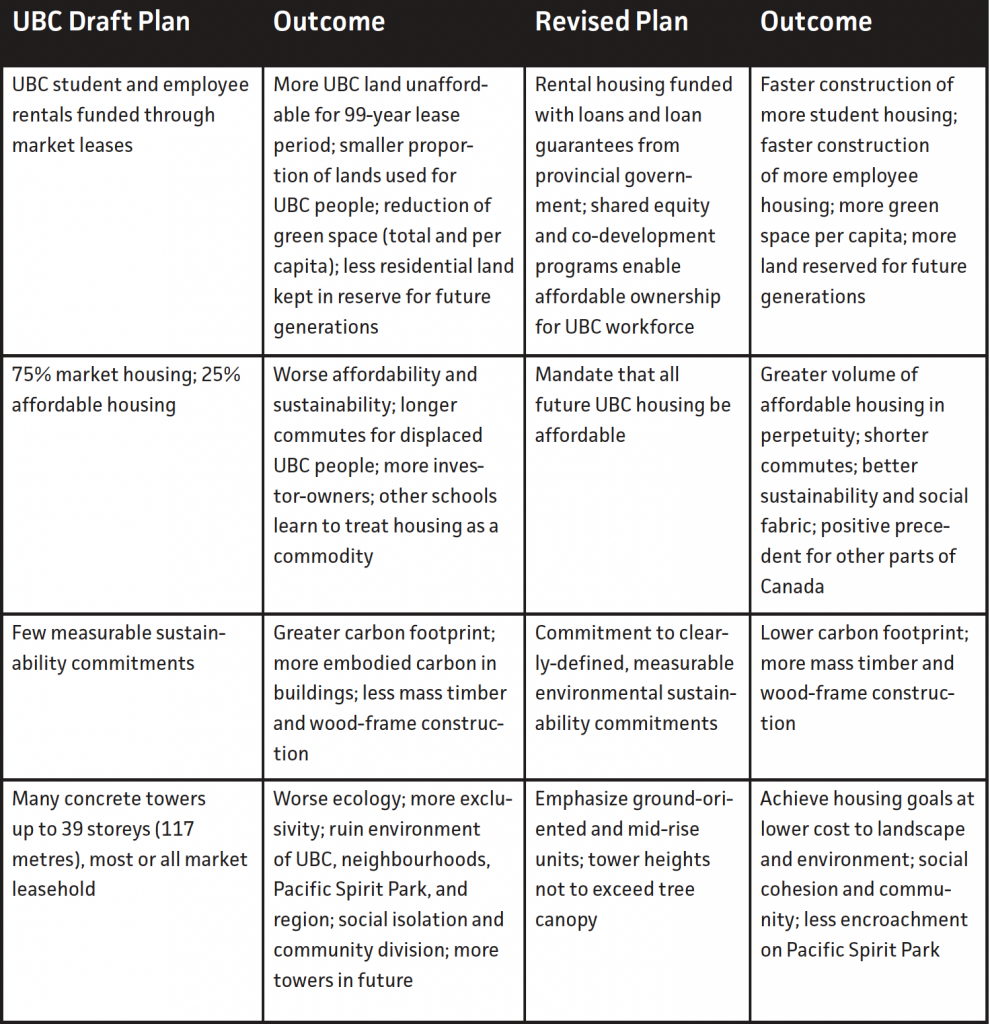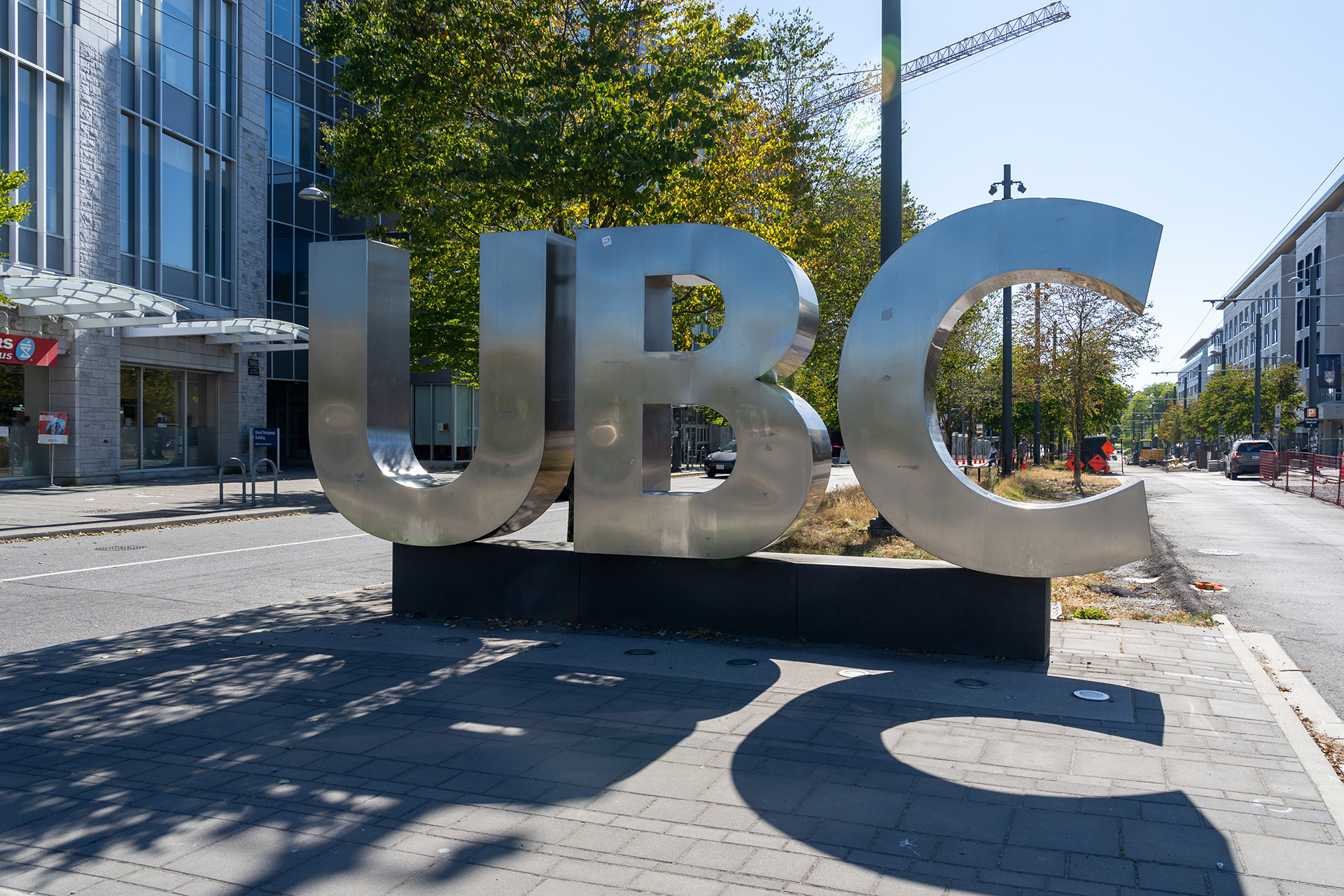Imagine a 39-storey spire in Wesbrook Place, nearly twice the height of any existing building on campus and visible across Pacific Spirit Park. Imagine a phalanx of 30-plus storey luxury condo towers in Acadia Park (now a student neighbourhood) looking down on families queued up at the Commons Block for the weekly food bank. Imagine the proportion of future housing at UBC that is affordable topping out at 25 per cent.
And keep in mind that, according to UBC’s grade scale, anything below 49 per cent is an F.
What you have just imagined is UBC’s most ambitious housing plan of the 21st century. UBC’s Board of Governors and the Provincial Government must now decide whether or not to set that plan in concrete. If the current Campus Vision 2050 goes forward, the one truth it would make visible far and wide is this: that UBC’s loftiest ambition for its land is to turn that land into money.
Now imagine an alternative future. UBC’s new president and the Provincial Government collaborate to ensure that all future housing here is affordable, forever. That new housing respects and enhances the environment. That students, staff, teachers, and others who want to work here are all housed—and housed well. That the land is not exhausted.
The Provincial Government has a decision to make. Along with Campus Vision 2050, UBC is proposing revisions to its Land Use Plan. If the Province accedes to these revisions, UBC will proceed to increase density while decreasing affordability and livability. UBC’s proposal is so terrible because it is the product of an unresolved conflict of interest.
UBC and the Province need to develop a new financing model that eliminates the incentive to commoditize university lands that has led UBC, again and again, to neglect the need for affordable housing. If the province permits UBC to continue its resource-extraction approach, the university will continue to fail in its stewardship of the land. Given the opportunity, UBC will always dig another oil well.
In addition to creating irreversible harm locally, UBC’s current plan would set negative precedents for Canada. The plan must be revised to achieve better outcomes on housing affordability, access, community, environmental sustainability, and reconciliation.
The table below explains a partial comparison of the outcomes of current UBC proposals, compared with superior outcomes of a revised plan:

The table also provides sufficient reasons for the Province to take these steps:
- Deny UBC’s requested revisions to the Land Use Plan, including the dramatic proposed increase to allowable building heights;
- Work with UBC’s new leadership to formulate a new plan for financing affordable housing on UBC lands, including government loans and loan guarantees; and
- Revise the University Act to mandate that all housing constructed on university lands be affordable and environmentally sustainable.
Positive outcomes would include:
- Creation of a much greater volume of affordable housing that is affordable in perpetuity;
- Holding UBC accountable to measurable Provincial targets on housing affordability and environmental sustainability;
- Enhancing the local community by making UBC livable to middle- and lower-income people, including not just UBC students and employees but also local teachers and workers;
- Avoiding the irreversible blight on the region that would be created by the construction of multiple 30+-story towers on high ground;
- Demonstrating the Province’s proactive commitment to getting housing policy right, and ushering in a new era of government-university cooperation.
All of these points have been made before by people who care deeply about this place – by UBC students, faculty, and staff; by campus residents and community members; by organizations such as the UNA; and by many scientists, including the head of the UBC Sustainability Hub.
All of us believe that UBC can and should do better with its land.
The Premier of British Columbia can ensure that it does.
CHRISTOPHER REA IS A CAMPUS RESIDENT, A UBC PROFESSOR, AND A 2023 RECIPIENT OF A UBC KILLAM FACULTY RESEARCH PRIZE.
